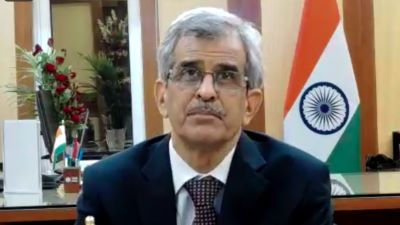Renewable energy has a special role in improving the status of women as their participation results in more direct positive outcomes

Today it is a well-established fact that the economic empowerment of women helps in increasing their overall status and also dilution of social norms that discriminate against them, remarked Indu Shekhar Chaturvedi, Secretary, Ministry of New and Renewable Energy (MNRE) while speaking at a webinar on “Women in Renewable Energy and Sustainability” held in collaboration with the International Solar Alliance (ISA).
“It also leads to greater economic growth in various sectors including renewables. However, this is just one part of the story as the participation of women also results in bigger economic output for the country,” continued Chaturvedi who believes that renewable energy has a special role in improving the status of women because their participation can result in more direct positive outcomes.
He elaborates further: “Solar cookers could result in positive outcomes, saving women from ill effects of fuel based options. One example is solar based anganwadi centres which we have tried in a limited way in collaboration with the Ministry of Women Welfare and Child Development. It can help in better education for mothers and their children. Renewable Energy powered applications like solar baking ovens, dryers, grinders etc. can help promote entrepreneurship in women. In remote areas without grid connected electricity, solar lights could help women work more productively in the evening. It is encouraging that the participation of women in this sector is greater than in the conventional energy sector.”
MNRE Secretary, however, believes that there clearly is a huge scope for improvement. “The question we need to answer is what proactive steps can be taken to enhance this to above the current level of about 32%. The government, of course, has been devising policies in this regard. One example is PM Ujjwala Yojna under which the primary target was 50 million subsidized LPG connections for adult poor women of eligible households which was later raised to 80 million and in 2020, another ten million target was added later. MNRE’s own scheme of small biogas plants has contributed to the construction of about 5 million tonnes of biogas plants. We also have some other examples where we give 0.5% rebate on interest on loans to women entrepreneurs. However, we do recognize that much more has to be done.”
“MNRE is working on an initiative to decentralize renewable energy livelihood applications and this, we believe, will be very useful for women. We aim to promote technologies, put in place standardization and quality control, and also facilitate financing. We expect the falling cost of technologies, particularly the storage, would help in achieving it,” added Chaturvedi.
Sharing his perspective, Dr. Ajay Mathur, Director General, ISA underlined the fact that, in the recent past, there has been a positive shift towards women occupying important positions in the renewable sector.
“Whether we are looking at leadership in the energy area or entrepreneurship in the energy area, or simply the consumers, we see women in a more centralized role. Experience tells us that there are more women in the energy area than we have seen previously in conventional ones. One reason of course is that because renewable energy is decentralized, the ability of women to provide services is far greater because of constraints in which a large number of women have to live. As we move away from machine based electrical engineering to logic based one, this makes a case that we see women in leadership positions in renewable energy,” explained Mathur.
Pointing out the fact that the banking system is currently largely dominated by and focused on men, Mathur emphasizes on formal assessment of credit worthiness of women-led organizations to channel the finances more effectively than in the past.
He explains: “I think we must look at the kind of successes that women entrepreneurs have had and include this into risk mitigation in the banking system. Whether through self-help groups or banking systems, the number of defaulters where women have been borrowers has been lower. I am told the figure is 12% for men based organizations and 3% for women based organizations.”
As per Director General of ISA, the kind of experiences that are required in order to develop and sell both renewable energy devices and renewable energy itself are well suited for the women entrepreneurs.
“In renewables there are two things that happen. One is the ability to tweak electronic renewable energy systems to meet expectations and demands is far greater than it is in conventional energy systems. Second is that physical distance between user and supplier is far less than in conventional energy. We see a far greater link of women with products and services than of men. The ability of women users to talk to women suppliers in the system is far greater than we have seen in the past. We obviously have great potential and it is in our hands to help bring this to reality,” concludes Mathur.
Subscribe to our newsletter & stay updated.